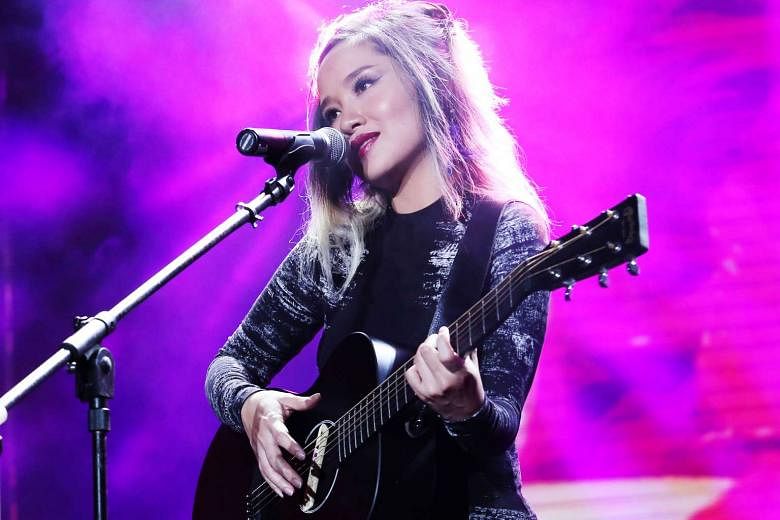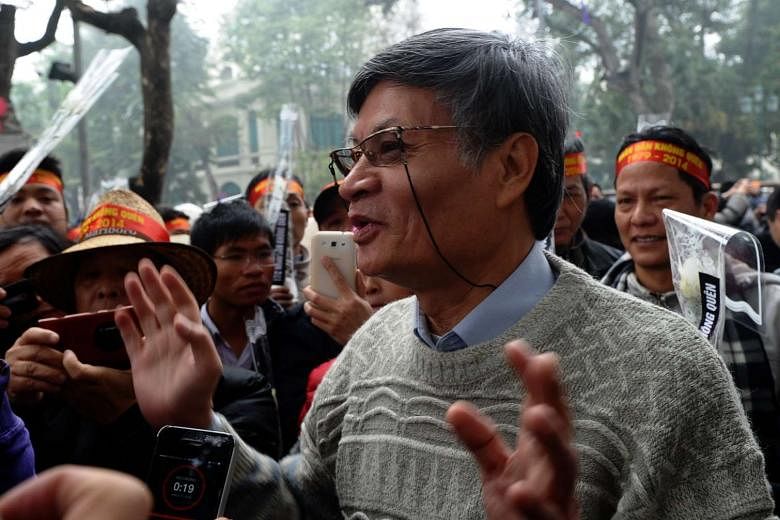HANOI (AFP) - Pink-haired pop star Mai Khoi, dubbed Vietnam's Lady Gaga for her risqué outfits, has found a new way to shock: running for parliament along with a motley crew of dissidents and activists testing the limits in the authoritarian nation.
The flamboyant singer is no stranger to controversy. Her song Selfie Orgasm prompted a storm of criticism, and her sartorial choices, including braless public appearances, regularly cause ripples of shock in the staid state-run media.
Now the 32-year-old has joined an array of lawyers, journalists, and political dissidents posing a challenge to the communist leadership by running for elected office in the National Assembly.
"The media discussion has centred on whether my views, lifestyle and dress sense are suitable for a member of the National Assembly," Mai Khoi told AFP.
"I am who I am. Ultimately, I hope people will judge me on the strength of my ideas, not the colour of my hair," she said, adding that she would work to promote gay rights and fight violence against women if elected.
On paper, Vietnam - unlike its northern neighbour China - has an admirably democratic constitution, which allows any person over 21 years to seek election to parliament, said academic Nguyen Quang A, another candidate.
In reality, however, more than 90 per cent of the some 500-strong legislative body are members of the ruling Communist Party, with the remaining lawmakers mostly wealthy business people seeking to advance their interests, he said.
"We're trying to help the regime to realise their rhetoric. Their rhetoric is very nice. The reality is very different," Quang A told AFP.
Quang A said he sees his run for parliament as part of a "democratic learning process" for the country which needs to learn to "serve not rule".
"Even in a dictatorship you can educate people to respect democratic values," he said, speaking deliberately loudly so that the plain-clothes police who often follow can hear.
After the March 13 deadline, some 100 independent candidates had applied to run for office in the polls to be held on May 22.
Although such candidates have run in previous National Assembly elections, this is the first time a significant number have sought to use polls as a form of peaceful protest against the one-party state.
Many interviewed by AFP said they were prepared for jail. But the likelihood is that more mundane administrative methods will be used to block them.
Candidates are required to submit detailed paperwork to local authorities in their home constituency, which the four interviewed by AFP all said had presented problems - mostly the authorities throwing up petty objections in a bid to disqualify them.
Mai Khoi said she had been threatened with rejection of paperwork over a minor irregularity which she had not been given a chance to correct.
"I can only imagine that this unreasonable request is the result of political interference and an attempt to block my candidature," the pop star told AFP, adding that the status of her application was unclear.
"The outcome of my case will send a clear message to the world about the fairness of the electoral process," she added.
If their paperwork is accepted, candidates will have to go through a series of interviews with local authorities and then Vietnam's Fatherland Front, which oversees national elections.
"I am not naive," said Quang A, lightheartedly putting his odds of actually getting elected at around 1 in 10 billion.
The government has not commented on the independents but the National Election Committee said this week that "foreign reactionary groups" were funding and supporting some candidates.
But the would-be parliamentarians are not to be deterred.
"We're pioneers," said former career soldier turned political activist Nguyen Tuong Thuy, who is a member of the banned Free Journalist Club.
Facebook and other social media are key tools which have allowed the independent candidates to use the polls in this way, he said, adding that they organise, raise support, and spread their message online.
"We want to encourage people to understand their rights. The authorities behave like (elections) are some gift they bestow, but it is our right as citizens," he said.
For Le Luan, 30, a lawyer, the desire to run was born out of a love for his profession and a frustration with the woeful state of lawmaking in the one-party state.
"But success for me is not about winning a position in parliament... Success will be realising my rights, and showing others that if I can do it, anyone can," he told AFP.


